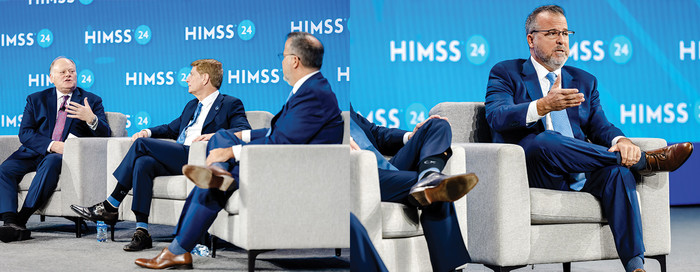Ahead of the weeklong conference, HealthTech took to social media to ask how healthcare organizations are currently leveraging generative AI. Of 347 respondents, about 21 percent said they used it for patient communication (the top answer, at about 29 percent, was for “other”).
#HealthIT stakeholders: We’re going to hear a lot about #AI in healthcare at #HIMSS24 this year. How is your organization currently leveraging generative AI?
— HealthTech Magazine (@HealthTechMag) March 4, 2024
HIMSS President and CEO Harold F. (Hal) Wolf III began the keynote session by reminding attendees of this year’s theme, “Creating Tomorrow’s Health,” and noting that the industry is not for those adverse to change.
Wolf said he expects healthcare IT’s main focus in 2024 will be to quicken the pace of digital health adoption and the development of new tools to move operation and patient considerations forward as fast as possible.
LEARN MORE: Get the details on the updated INFRAM from HIMSS.
Because healthcare continues to face myriad challenges — including an aging patient population that will require more caregivers, staffing shortages and low funding levels — “business as usual just isn’t possible,” he said.
That’s why HIMSS is particularly interested in helping healthcare organizations foster sustainability — in practice, in delivery systems and in dealing with the environment. Sustainability is one of the focus areas in HIMSS’ newly modernized Infrastructure Adoption Model.
Wolf also highlighted the importance of breaking down AI solutions into more relevant categories, such as small devices and operational apps, so that organizations gain a better understanding of the tools.
'We Must Build the Health System of the Future'
Garrett continued the AI discussion once he took the stage. “Harnessing AI will be one of the defining tasks, I believe, of the 21st century,” he said.
Garrett, who was named chair of the World Economic Forum's Health and Healthcare Governor's Community last year, shared his learnings from a Davos meeting on the four global healthcare priorities for the governance of AI: improving care access; improving outcomes and providing better value; health equity; and climate change’s impact on health.
With some 40 years of experience in the industry, Garrett said he remains an optimist and believes AI has the potential to change the scale and pace of healthcare innovation.
“We need radical transformation. We must build the health system of the future,” he said, especially amid the current challenges of staffing shortages and burnout.
EXPLORE: Navigate the balancing act of tight budgets and healthcare innovation.
AI should be used to eliminate mundane tasks so that clinical teams can work at the top of their license. Garrett highlighted a number of AI capabilities in production as pilot programs at Hackensack Meridian Health, including chatbots, radiology workflows, optimization of operating room scheduling, and education for medical students.
Governmental regulations are unlikely to keep pace with AI developments, he added, so the healthcare industry needs to lead the charge and create public-private groups to implement safeguards.
And with health equity as part of the Quintuple Aim, healthcare organizations can take the necessary steps to close care gaps. “With AI, we can take another quantum leap forward,” he said.
Even with all of these technological advancements, humans need to remain at the center, which is why patient privacy and reducing the potential for bias are crucial. “Humans are the heart of healthcare. Technology cannot replace the human touch,” Garrett said.














